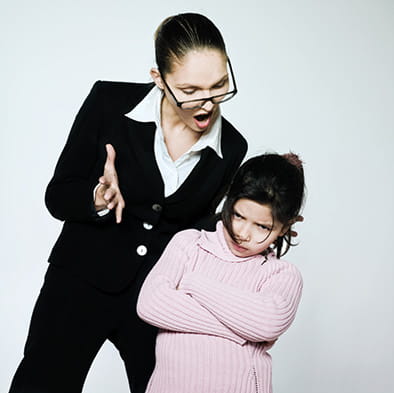Do you over-schedule extracurricular activities for your child? DO YOU give them a drubbing every time they fail to score a perfect 10? Do you find yourself accompanying them to every birthday party or sleepover they are invited to? If you find yourself answering in the positive to all of the above, you are probably what is known as a ‘hyper parent’.
Lachmi Deb Roy finds out how hyper-parenting is affecting kids
of today.

Thirty-two year old Malati Gupta’s evenings are always chock-a-block. From the moment she picks her six-year-old daughter from school, it is a never-ending saga of karate classes, dance classes and private tuitions until bedtime, that the little one has to cope with. By the time the tiny tot heads home, she is barely able to keep her eyes open. Malati’s friends have very often pointed out that she needs to slow down, but Malati refuses to listen, explaining that she is doing this for her child’s good.
Malati belongs to the set of parents who have come to be labelled ‘hyper parents’ in today’s world. Burdening our children with our own dreams is not really a recent phenomenon, but it seems like, parental enthusiasm is going a little too far nowadays in our desire to create superkids.

THE PERFECT CHILD SYNDROME
Urban parents in the hope of making their kids perfect are pushing the pedal too hard which can damage the growth of the child. They bring up their children as competitors of each other, who are compelled to run a race with an undefined finishing line right throughout childhood. Primary school teacher Runa Singh says, “It seems that the expectation of the parents is increasing with each passing year. And they never seem to be happy. They want their kids to excel in everything. They are not happy if the child gets an eight out of ten. They want a ten out of ten
in every activity.”
Time spent in making sand castles or playing with Barbies has given way to piano lessons, soccer practice, maths tuitions, science tuitions and the list is endless. Parents now judge their kids on every aspect of their performance in their class, be it sports or academics. Raising the next Tiger Woods or Serena Williams has become more important for parents than raising
a happy and emotionally sound child. Resist the pressure of expecting your child to excel in whatever they do. This may have an adverse effect by burning them out too early in life.
Psychologist Seema Hingorrany says, “Parents today are more focused on the intellectual development of the child rather than their emotional development. They have a tendency to push their insecurities on to the child. As a result, children automatically get burdened with undue responsibilities. It is time parents stopped bothering them with a lot of expectations as this leads to damaging the emotional growth of the children,” Hingorrany adds. “There was a time when a parent came to me with a child who was suffering from severe depression. After speaking to the girl at length,
I came to know that this started with her mother wanting her to look like her cousin sister. It became some kind of a competition for the mother when she wanted her to be as stylish as her cousin,”
adds Seema.

WHY PARENTING HAS BECOME A BIG ISSUE
New-age parents are letting guilt come in the way of enjoying the true purpose of parenting. This is primarily because of the fallout of the joint family system. There was a time when there were a large number of people to take care of our kids. Now, parents go through the ups and downs alone and they don't have it easy. The concept of parenting has also undergone a sea change. Parents start gearing themselves up years before having children by attending workshops on parenting, reading books on bringing up kids, so by the time the child arrives, parents are ready to go full throttle.
On the other hand, a career woman obsesses over their child because there is some guilt playing at the back of their minds that they are not able to give their kids the time they wish to. On the other hand, there are full-time moms who enforce their dreams on the kids and burden the child with undue parental pressures at a young age when they are supposed to play around and have a good time. If the kid fails to perform up to the expectation of the parents, then they take it as a personal failure.
Sociologists also say that parents these days have one child, since most of them obsess over their only child a little more than required and their attention is also unendingly focussed on the child. Then there are women opting for parenthood far later in life after having spent considerable time on their careers. So, when they quit their job, the tendency is to treat parenting as a full-time job. Hingorrany says, “By over-pressurising the child, you are killing his/her individuality. Every child is unique. They are different individuals and there should be no comparison either with siblings or with their friends. Parents have no right to programme them. Their duty is to guide them. I advise parents to suggest their kids to do a certain activity, but they should never order them. Keep the tone mild. Find out what the child wants.”
Parents too need counselling. “It is important for parents to see if they are over-expecting from their kids. Make them understand that it is normal to make mistakes. And that people learn from their mistakes,” says Runa.

QUESTIONS PARENTS NEED TO ASK THEMSELVES
• Are you overdoing the parenting bit?
• Are you always open to advice from experts?
• Are you always emphasizing on productive time?
• Are you giving your child enough time to dream?
• Are you treating parenting as a competition?
• Are you overscheduling your child?
• Are you living through your kids?


